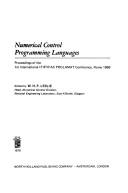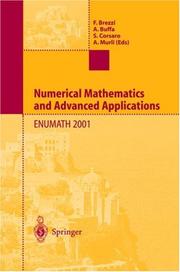| Listing 1 - 2 of 2 |
Sort by
|

ISBN: 0720420393 9780720420395 Year: 1970 Publisher: Amsterdam: North-Holland,
Abstract | Keywords | Export | Availability | Bookmark
 Loading...
Loading...Choose an application
- Reference Manager
- EndNote
- RefWorks (Direct export to RefWorks)
Computer-Assisted Instruction. --- Mathematics. --- 519.68 <063> --- Machine-tools --- -#KVIV --- 681.3*D3 --- Automatic machine-tools --- Machine-tools, Automatic --- Transfer machines --- Metal-working machinery --- Tools --- Machining --- Manufacturing processes --- Mathematic --- Computer programming--Congressen --- Numerical control --- -Congresses --- Programming languages --- Congresses. --- 681.3*D3 Programming languages --- 519.68 <063> Computer programming--Congressen --- Computer-Assisted Instruction --- Mathematics --- #KVIV --- Programmed Instruction, Computerized --- Self-Instruction Programs, Computerized --- Computer Assisted Instruction --- Computer-Assisted Instructions --- Computerized Programmed Instruction --- Computerized Self-Instruction Program --- Computerized Self-Instruction Programs --- Instruction, Computer-Assisted --- Instruction, Computerized Programmed --- Instructions, Computer-Assisted --- Program, Computerized Self-Instruction --- Programs, Computerized Self-Instruction --- Self Instruction Programs, Computerized --- Self-Instruction Program, Computerized --- Numerical control&delete& --- Congresses --- Augmented Reality

ISBN: 8847001803 8847021677 8847020891 Year: 2003 Publisher: Milano Springer
Abstract | Keywords | Export | Availability | Bookmark
 Loading...
Loading...Choose an application
- Reference Manager
- EndNote
- RefWorks (Direct export to RefWorks)
Scientific computing is a fast growing and fast changing area whose applications to various branches of science, engineering, medicine, economics (and others) are increasing in number and relevance every day. There are two main reasons (among others) that make scientific computing change so rapidly. One is the increasing number of different research areas beginning to make use of numerical simulation: from nanotechnology to genomics, from computer aided diagnosis and operations in medical applications (which involve often com plete simulations of parts of the human body) to economics and finance. Each new application, and each new aspect of earlier applications, draws heavily on the know how that has been acquired on other problems with similar mathematical features. It has to be pointed out that the lofty perspective of mathematics succeeds quite often in finding connections among very different phenomena, that tum out in the end to share the same mathematical and numerical structure. In tum, new applica tions contribute to the cross-fertilization by "sending back" new interpretations and suggestions which are often useful in more classical applications. All this creates a resonance effect that contributes greatly to the growth rate of the whole field.
519.6 <063> --- 519.62 <063> --- 519.63 <063> --- 681.3*G17 <063> --- 681.3*G18 <063> --- 681.3*G18 <063> Partial differential equations: difference methods; elliptic equations; finite element methods; hyperbolic equations; method of lines; parabolic equations (Numerical analysis)--Congressen --- Partial differential equations: difference methods; elliptic equations; finite element methods; hyperbolic equations; method of lines; parabolic equations (Numerical analysis)--Congressen --- 681.3*G17 <063> Ordinary differential equations: boundary value problems; convergence and stability; error analysis; initial value problems; multistep methods; single step methods; stiff equations (Numerical analysis)--Congressen --- Ordinary differential equations: boundary value problems; convergence and stability; error analysis; initial value problems; multistep methods; single step methods; stiff equations (Numerical analysis)--Congressen --- 519.63 <063> Numerical methods for solution of partial differential equations--Congressen --- Numerical methods for solution of partial differential equations--Congressen --- 519.62 <063> Numerical methods for solution of ordinary differential equations--Congressen --- Numerical methods for solution of ordinary differential equations--Congressen --- 519.6 <063> Computational mathematics. Numerical analysis. Computer programming--Congressen --- Computational mathematics. Numerical analysis. Computer programming--Congressen --- Mathematical analysis. --- Analysis (Mathematics). --- Applied mathematics. --- Engineering mathematics. --- Computer mathematics. --- Analysis. --- Applications of Mathematics. --- Computational Mathematics and Numerical Analysis. --- Computer mathematics --- Electronic data processing --- Mathematics --- Engineering --- Engineering analysis --- Mathematical analysis --- 517.1 Mathematical analysis
| Listing 1 - 2 of 2 |
Sort by
|

 Search
Search Feedback
Feedback About UniCat
About UniCat  Help
Help News
News